|
Before Tolkien was a member of the Inklings, he was a member of the TCBS. TCBS stood for Tea Club and Barrovian Society, so named because the members had surreptitious tea parties in the school library and also drank tea together at the Barrows Store. The core members of the club were four young men who had attended King Edward's School in Birmingham together, Robert Gilson, the son of the school's headmaster, Christopher Wiseman, J. R. R. Tolkien, and G.B Smith. The young men all wrote poetry, painted, and drew. They were intellectually ambitious. As a club, they hoped to spur each other on to great accomplishments. However, their youthful ambitions were tragically upended by World War 1. In the summer of 1916, exactly one hundred years ago, all four of them had shipped out to France. They spent their days marching through mud, dodging bullets and shrapnel, and crawling through trenches filled with vermin and lice. Robert Gilson was the first to die at the Somme on July first, 1916. After receiving the news, Tolkien wrote in a letter to the remaining members of the club, dated August 12, 1916 :
"So far my chief impression is that something has gone crack. I feel just the same to both of you--nearer if anything and very much in need of you--I am hungry and lonely of course--but I don't feel a member of a little complete body now. I honestly feel that the TCBS has ended . . . . Still I feel a mere individual at present--with intense feelings more than ideas of powerlessness"(Letters 10). G.B. Smith was wounded by a shell on November 29 and died of his wounds on December 3. Throughout the fall of 1916 Tolkien fought in the trenches, seeing notable action at the battle of Thiepval. He served as a signalman for the Lancashire Fusiliers sending out signals of troop movements, calls for more grenades, etc. On October 25 he visited the medical officer, complaining of a fever. He had contacted trench fever, which was caused by bites from the lice. He was sent home. Since the fever allowed him to escape from the front, it almost certainly saved his life. Already an orphan, Tolkien lost two of his closest companions that summer. The club they had created with so much youthful energy and hope, was no more. Tolkien only saw Christopher Wiseman a few times over the course of the rest of his life. Perhaps it was too sorrowful for the two of them to meet without the others. If there is something elegaic about the male friendships in The Hobbit and The Lord of the Rings, that sadness is the result of the summer and fall of 1916. Tolkien's old school, King Edward's has a gallery of photos on the great war as well as a movie about Tolkien's experiences at the front made by students at the school. There is also a film about Robert Gilson. I also recommend Joseph Leconte's excellent article published this June in the New York Times about how Tolkien found Mordor in 1916 during the deadly summer of the Somme.
5 Comments
A friend of mind posted this wonderful article about Hobbit food on face-book: http://oakden.co.uk/tea-in-the-hobbit/ The amazingly gifted illustrator of John Ronald's Dragons, Eliza Wheeler, has a Hobbit party every year that she makes Hobbit food for. Perhaps this true love for all things Hobbit explains why she seems to have read my mind in composing the pictures for the book.
My favorite thing in this article is the explanation of the distinction between high and low tea. I will definitely use this article next time I take students to Oxford and will perhaps give extra points for participation in both a high and a low tea. I'm sorry that the recipes are all in UK measurements. They look quite old fashioned and complicated, just the sort of thing to make a huge mess in the kitchen, which i secretly like doing. I have not yet tried any of them out, but when I do I will write a post about it and include pictures of my creations.I may try some of them out on my next group of Oxford students. I stole the photo below from food.com. It is a photo of Mrs. Beeton's Seed Cake. Mine, when I make it, will be much less artful. 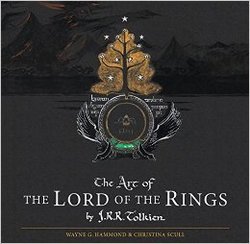 It just arrived in the mail. My own copy of The Art of the Lord of the Rings by Wayne G. Hammond and Christina Scull. Their earlier book, J. R. R. Tolkien: Artist and Illustrator, was invaluable to me as I was doing my research for John Ronald’s Dragons. The book itself is beautiful: square shaped to match the square pieces of graph paper on which Tolkien sketched many of his preliminary maps. And this book is full of maps, from rudimentary squiggles on the back of discarded index cards to elaborate three color topographical masterpieces. It is also full of script. For those of you contemplating a tattoo with the ring inscription, you can choose from a whole variety of drafts photographed in this book. As a Tolkien lover, I am interested in maps and script and what they have to do with each other. And as a children’s writer I am interested in how learning to read maps is an exercise in literacy. In Maphead Ken Jennings points out that “a good map isn’t just a useful representation of a place; it’s also a beautiful system in and of itself” (7). As someone who studied linguistic systems, Tolkien would naturally be drawn to mapping. When the narrator of The Hobbit says of Bilbo, “ He loved maps, and in his hall there hung a large one of the Country Round with all his favourite walks marked on it in red ink,” we can intuit that Tolkien was also speaking of himself. Cartophilia was yet another way in which Tolkien was a hobbit. Maps are at once concrete and abstract. They represent an idea of place and space, but the representation is in symbols that we must learn to interpret: triangles for mountains, squiggly lines for rivers, etc. etc.. Ken Jennings notes the attraction he felt for maps as a child and suggests “that many people’s hunger for maps (mappetite?) peaks in childhood.” A map at the beginning of a children’s book is a promise. It promises adventure, travel, discovery, the unknown. As Nicholas Tam points out in his excellent blog, they enhance the reader's immersive experience of reading. 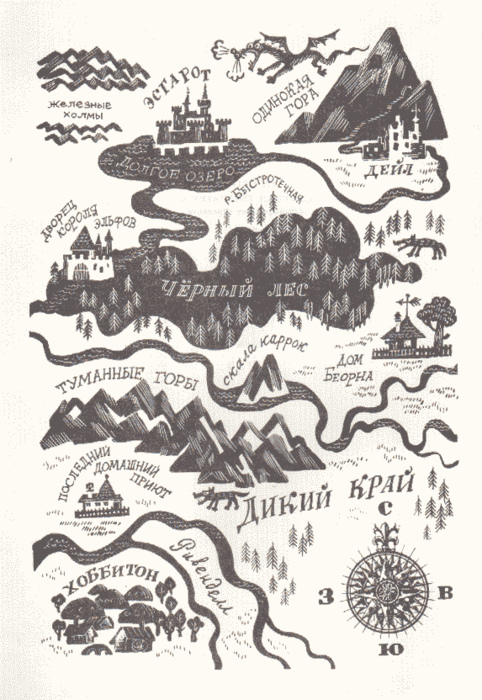 A great deal has been written by academics about maps as cultural artifacts. And several bloggers and critics have noted the charming Russian version of Thror’s map in the Russian translation of The Hobbit as proof of the cultural specificity of maps. Tolkien hated it when translators of his works attempted to translate place names, and I suspect that he might have reacted to the slavicisation of his map at the beginning of The Hobbit as he reacted to the Dutch translation of place names in his works. In a letter to his publisher, he complained: “The toponymy of The Shire . . . is a ‘parody’ of that of rural England, in much the same sense as are its inhabitants: they go together and are meant to. . . . I would not wish, in a book starting from an imaginary mirror of Holland, to meet Hedge, Duke’sbush, Eaglehome, or Applethorn even if these were ‘translations’ of ‘sGravenHage, Hertogenbosch, Arnhem, or Apeldoorn! These translations are not English, they are just homeless.” Many people have written more eloquently about Tolkien’s maps than I. Here is a wonderful blog about fantasy maps with a detailed discussion of Thror's map. And here is a review of The Art of the Lord of the Rings from Wired Magazine. |
Caroline McAlisterCaroline is an avid reader, children's writer, and teacher. She lives in North Carolina with her husband and dog. Check out her bio for more! Archives
February 2024
Categories
All
|
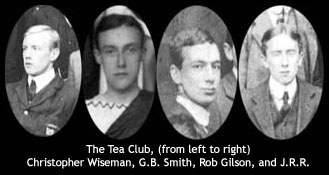
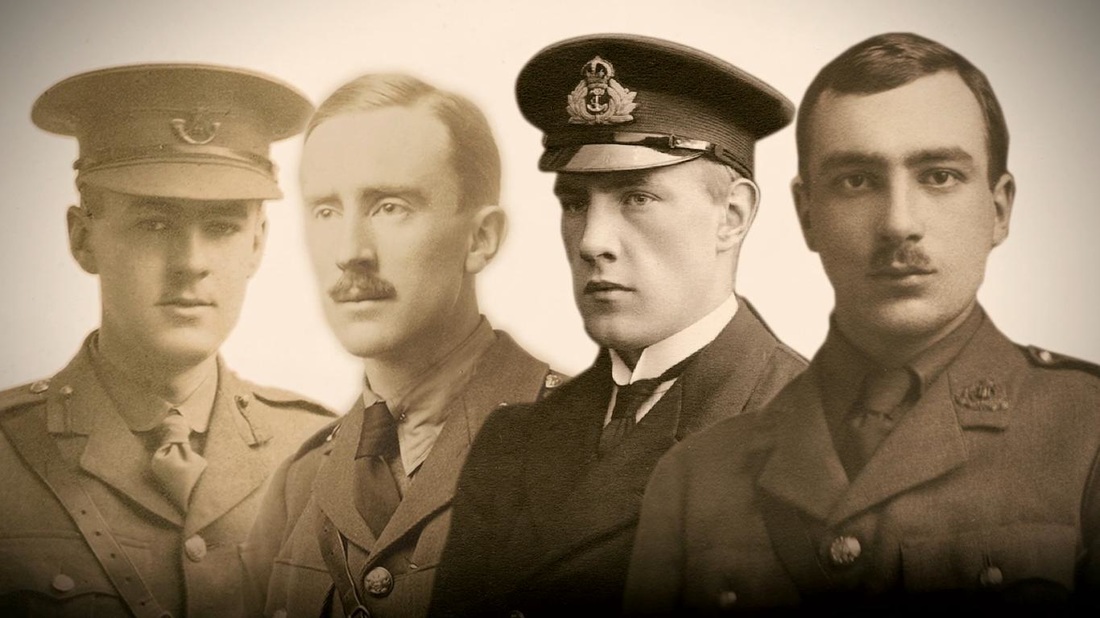

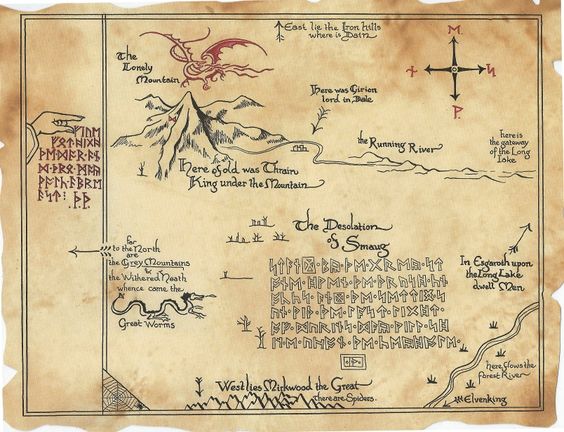
 RSS Feed
RSS Feed